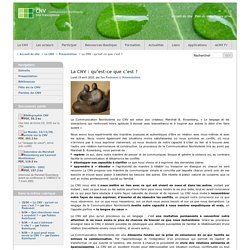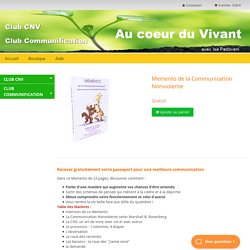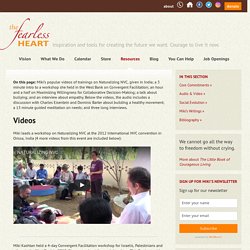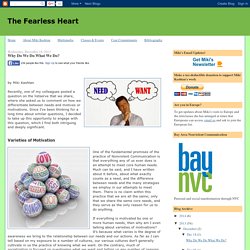

☮ Communication NonViolente. La CNV : qu'est-ce que c'est ? Nous avons tous expérimenté des manières joyeuses et authentiques d’être en relation avec nous-mêmes et avec les autres.

Nous vivons également des situations moins satisfaisantes où nous sommes en conflit, où nous n’arrivons pas à nous exprimer clairement, où nous doutons de notre capacité à créer du lien et à trouver avec l’autre une relation harmonieuse et constructive. Le processus de la Communication NonViolente mis au point par Marshall B. Rosenberg, nous permet de : MaxiPoster A2 sentiments et besoins. By letigribouille 2 poster à imprimer en version A2 (= nécessite 4 feuilles A4 ) et en version A4 sur lesquels vous retrouverez 25 sentiments et ressentis et 25 besoins universels.Une invitation à créer des espaces d'affichage pour que dans nos lieux de vie nous puissions nous offrir des temps pour écouter nos sentiments et nos besoins et rencontrer ceux des autres êtres.

Support de connaissance de soi, outils pour prendre soin de nos relations avec les autres, je fais le vœux que ces affichages contribuent à créer un monde ou se relier à soi et aux autres devienne aussi naturel qu'habituel.Comme pour les cartes, je vous propose ces posters sous forme de participation consciente, afin que chacun puisse contribuer à la hauteur de sa joie à soutenir la création et la diffusion de ces outils au plus grand nombre.Gribouilleusement.
Isa Padovani. Memento de la Communication Nonviolente. Parler d'une manière qui augmente vos chances d'être entendu Sortir des schémas de pensée qui mènent à la colère et à la déprime Mieux comprendre votre fonctionnement et celui d'autrui Vous rendre la vie belle face aux défis du quotidien !

Table des Matières : Intention de ce Memento La Communication Nonviolente selon Marshall B. "Ces profs qui changent l'école" - Le film. On Fear, Anger,Guilt, Shame. Tending or Ending a Relationship ~ NVC Quick Connect Oct 2015. Tending or Ending a Relationship ...continued In my view, learning NVC is no guarantee for positive relationships.

Moreover, I don't consider ending a relationship to be a "failure" as some do. More important to me than whether people maintain relationships or bring them to closure is the question of how they reach those decisions and how they relate to each other while making them. One of the essential insights that NVC presents is the distinction between our core needs and the strategies we employ for attending to our needs. Needs are finite and tend to be universal. I like to group them into four basic categories: subsistence and security, freedom, connection, and meaning. Core Needs List - Practical NVC.
Internalized Oppression. The Fearless Heart. On this page: Miki’s popular videos of trainings on Naturalizing NVC, given in India; a 3 minute intro to a workshop she held in the West Bank on Convergent Facilitation; an hour and a half on Maximizing Willingness for Collaborative Decision-Making; a talk about bullying; and an interview about empathy.

Below the videos, the audio includes a discussion with Charles Eisentein and Dominic Barter about building a healthy movement; a 13 minute guided meditation on needs; and three long interviews. Miki leads a workshop on Naturalizing NVC at the 2012 International NVC convention in Orissa, India (4 more videos from this event are included below): Miki Kashtan held a 4-day Convergent Facilitation workshop for Israelis, Palestinians and others in the West Bank in 2013. She wrote about the workshop here. This 3-minute video was created to describe and raise funds for the workshop. Miki Kashtan on group decision-making at the 2011 Making Collaboration Real Conference in San Francisco:
Loving Ourselves Harder & Managing Anger - NVC Quick Connect Nov 2011. Loving Ourselves "Harder"... continued I find this repeatedly at trainings and working with my coaching clients (and with myself): we can judge ourselves harshly—often much more harshly than we would judge others—and that this judgment actually gets in the way of our making the changes we want in life.

I also find that when we are judging ourselves, we often are judging others too. I recently came across an interesting article about this in a study focused on investing. It seems in most attempts to get people to invest, there is some form of "should" that is often fear-based (i.e., that you "should" start by a certain age, and invest X amount, etc, since if you don't start investing now, you won't have enough when you retire... ). It also seems that this approach is not very effective. It offers a kind of extrinsic rather than intrinsic motivation. Why Do We Do What We Do? If everything is motivated by one or more human needs, then why am I even talking about varieties of motivations?

It’s because what varies is the degree of awareness we bring to the relationship between our needs and our actions. As far as I can tell based on my exposure to a number of cultures, our various cultures don’t generally cultivate in us the practice of knowing what we want. On the contrary, much of socialization is focused on questioning what we want and telling us any number of reasons for acting other than because we want something. Practice Resources – Kinyon’s NVC Mediation. Martha Graham Quote. Inspiration and tools for creating the future we want. Courage to live it now.